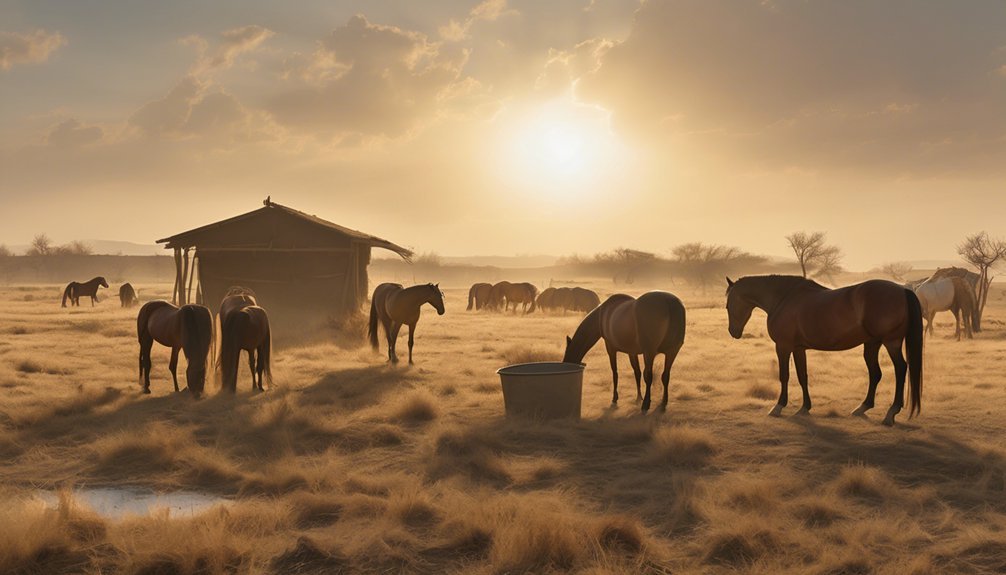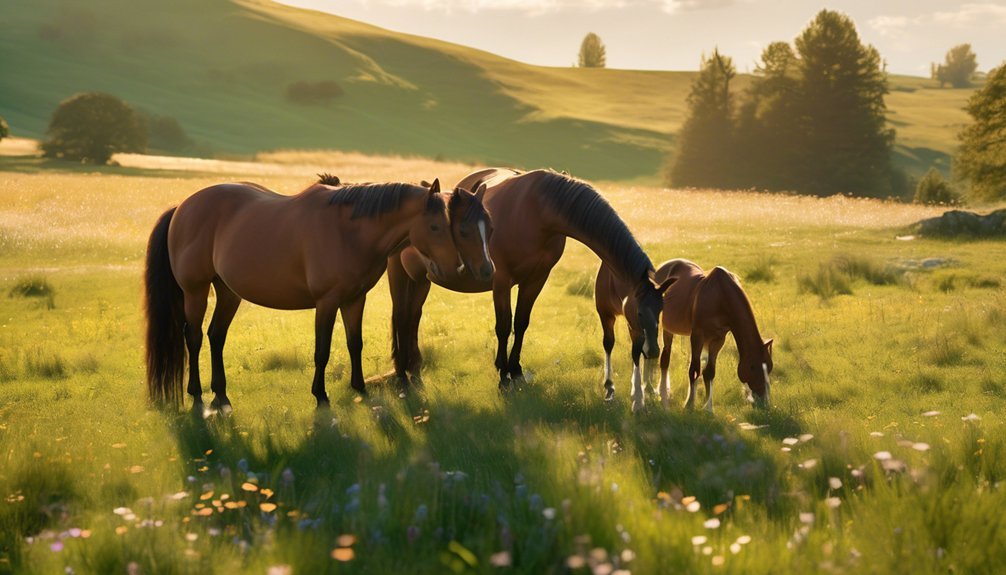
Understanding the vitamin and mineral requirements in horses is critical for their health and performance. Recognizing the roles of essential nutrients, identifying specific needs based on individual circumstances, and acknowledging the potential consequences of deficiencies are all vital components of equine nutrition. However, many horse owners overlook these aspects, leading to unintended health issues. What factors should you consider when evaluating your horse's diet, and how can you ensure they receive optimal nutrition?
Key Takeaways
- Vitamins A, D, E, K, and B-complex are essential for energy metabolism, immune function, and overall health in horses.
- Key minerals like calcium, magnesium, and phosphorus support bone health, muscle function, and hydration in equines.
- Factors such as age, activity level, breed, and environmental conditions influence the specific nutritional needs of horses.
- Signs of deficiencies include dull coats, weak hooves, lethargy, and behavioral changes, indicating a need for dietary adjustments.
- A balanced diet rich in fresh forage and fortified feeds ensures optimal vitamin and mineral absorption for equine performance.
The Importance of Vitamins and Minerals in Equine Health

Vitamins and minerals play a critical role in maintaining the overall health of horses, as they support various bodily functions essential for performance and well-being.
You need to understand that proper vitamin absorption is crucial; without it, your horse may face deficiencies that could hinder energy levels and immune response.
Additionally, the interactions between minerals can significantly affect their absorption rates. For instance, an excess of one mineral can inhibit another's absorption, leading to imbalances.
It's vital to ensure your horse's diet is well-rounded, considering these interactions to promote optimal health.
By paying attention to these nuances, you can help your horse thrive, enhancing not just performance but also overall vitality and longevity.
Key Vitamins Essential for Horses
Understanding the specific vitamins your horse needs is vital for ensuring optimal health and performance. Key vitamins include fat-soluble vitamins like A, D, E, and K, which play crucial roles in vision, bone health, and immune function.
Water-soluble vitamins, such as B-complex and C, support energy metabolism and help with stress management. You'll want to ensure proper vitamin absorption by providing high-quality sources, including fresh forage and fortified feeds.
Essential Minerals for Optimal Equine Performance

While you focus on your horse's overall nutrition, don't overlook the importance of essential minerals that play a pivotal role in maintaining optimal equine performance.
These minerals are crucial for various bodily functions and can significantly impact your horse's health and athletic capabilities. Here are four essential minerals to consider:
- Calcium Sources: Vital for bone health and muscle function, ensure your horse gets calcium from high-quality forage or supplements.
- Magnesium Roles: This mineral aids in muscle contraction and energy metabolism, helping to prevent cramping during physical activity.
- Phosphorus: Works closely with calcium to maintain strong bones and teeth.
- Sodium: Essential for hydration and maintaining electrolyte balance, especially in active horses.
Factors Influencing Nutritional Needs in Horses
When considering your horse's nutritional needs, various factors come into play that can significantly impact their dietary requirements.
Age factors are crucial; younger horses may need more nutrients for growth, while older horses often require specific support for health issues.
Activity levels also matter; performance horses have different needs compared to those that are leisurely ridden.
Breed differences can influence metabolism and nutrient absorption, making tailored diets essential.
Environmental conditions, like temperature and humidity, affect hydration and forage quality.
Health status, including any medical conditions, dictates specific vitamin and mineral needs.
Finally, seasonal variations can impact forage availability, necessitating adjustments in feeding practices to ensure optimal metabolic rates and overall well-being.
Signs of Vitamin and Mineral Deficiencies

Recognizing the signs of vitamin and mineral deficiencies in your horse is crucial for maintaining their health and performance. Nutritional imbalances can lead to various deficiency symptoms that may affect your horse's well-being.
Pay close attention to the following signs:
- Dull coat or poor skin condition
- Weak hooves or excessive cracking
- Decreased energy levels or lethargy
- Behavioral changes, such as irritability or anxiety
These symptoms often indicate underlying nutritional deficiencies that need addressing.
Supplements vs. Natural Sources: What's Best for Your Horse?
How can you determine whether supplements or natural sources are the best option for your horse's vitamin and mineral needs?
First, consider supplement quality. High-quality supplements can provide concentrated nutrients, but they may not always match the bioavailability found in natural sources.
Natural absorption of vitamins and minerals often occurs more effectively when horses consume whole foods, like fresh pasture or quality forage.
Evaluate your horse's diet to identify gaps; if natural sources aren't meeting their needs, targeted supplements might be necessary.
However, you must choose supplements wisely, focusing on reputable brands that ensure optimal nutrient delivery.
Ultimately, striking a balance between natural and supplemental sources can support your horse's health while respecting their unique dietary preferences.
Balancing Your Horse's Diet: Practical Tips

Finding the right balance in your horse's diet is key to ensuring optimal health and performance. Achieving dietary balance involves carefully selecting nutrient sources and monitoring your horse's condition.
Here are four practical tips to help you:
- Evaluate Forage Quality: Ensure your horse has access to high-quality hay or pasture, as it's the primary source of nutrients.
- Choose the Right Concentrates: Use grain or commercial feed that complements their forage and meets specific nutrient needs.
- Monitor Body Condition: Regularly assess your horse's weight and adjust feed accordingly to avoid obesity or deficiency.
- Incorporate Supplements Wisely: If needed, add vitamins and minerals based on your horse's individual requirements.
These steps can significantly enhance your horse's overall health and performance.
Consulting a Nutritionist: When and Why It Matters
Consulting a nutritionist can be a game-changer for your horse's health, especially when you're faced with complex dietary needs or specific performance goals.
A professional can conduct a thorough nutritional assessment, identifying any deficiencies or excesses in your horse's current diet. This tailored approach ensures that the feeding strategies implemented are optimal for your horse's unique requirements, whether it's for growth, maintenance, or peak performance.
When you notice changes in your horse's behavior or condition, it's time to seek expert advice. A nutritionist can help you navigate the myriad of supplements and feeds available, ensuring your horse receives balanced nutrition that supports overall well-being.
Investing in this expertise can significantly enhance your horse's health and performance.
Frequently Asked Questions
Can Horses Get Too Many Vitamins and Minerals?
Yes, horses can experience vitamin toxicity and mineral imbalance if they consume excessive amounts. Monitoring their intake and ensuring a balanced diet is crucial to avoid potential health issues related to nutrient over-supplementation or deficiencies.
How Do Age and Activity Level Affect Vitamin Needs?
Age and activity level significantly influence vitamin needs. Young horses require more nutrients for growth, while active horses need extra support for muscle and energy. Tailoring their diets ensures optimal health and performance throughout their lives.
Are There Specific Vitamin Needs for Pregnant Mares?
Pregnant mares need specific vitamins to support fetal development. You should focus on folic acid, vitamin E, and calcium; these nutrients are crucial for proper growth and health during this vital stage of their lives.
How Do Seasonal Changes Impact a Horse's Nutrient Requirements?
You might not realize how seasonal grazing and temperature fluctuations significantly affect your horse's nutrient needs. As conditions shift, their diet must adapt to ensure optimal health, requiring careful attention to their changing nutritional requirements.
What Are the Best Sources of Vitamins for Senior Horses?
For senior horses, consider high-quality hay alternatives and specially formulated equine supplements. These sources provide essential vitamins while supporting overall health, ensuring your horse thrives even in their golden years. Prioritize balanced nutrition for optimal well-being.
Conclusion
In conclusion, understanding your horse's vitamin and mineral needs is vital for their health and performance. Did you know that approximately 70% of performance-related issues in horses can be traced back to nutritional deficiencies? By ensuring a balanced intake of essential vitamins and minerals, you can significantly enhance your horse's well-being and athletic capabilities. Always consider their unique requirements and consult a nutritionist when needed to optimize their diet and prevent potential health issues.





